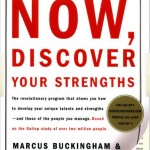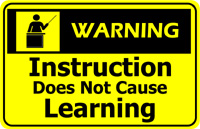As difficult as it must be for you to believe, dear readers, there are some things at which I am not amazingly skilled. In fact (brace yourselfs) there are multiple areas where my skill level is so low that special measuring equipment must be brought in just to determine the exact level of suckitude. (I suspect that that is a “Havi-ism” but I’m not good enough at attribution to go and check it out.)
 I used to work frantically (and usually unsuccessfully) to either cover up or rationalize these areas — because after many years of education I’d been convinced that we all had to be good at everything. Geometry, Chemistry, English, Folk Dancing, Athletics — and that if you weren’t great you just kept slogging to improve.
I used to work frantically (and usually unsuccessfully) to either cover up or rationalize these areas — because after many years of education I’d been convinced that we all had to be good at everything. Geometry, Chemistry, English, Folk Dancing, Athletics — and that if you weren’t great you just kept slogging to improve.
Then, I read “Now, Discover Your Strengths” byMarcus Buckingham. (Well, I already knew Marcus from “First, Break All The Rules”.) People talk about books that change their lives, and this was the one that did it for me.
In a nutshell: You’ve got things that you’re really great at, and things that you suck at. (Well, he doesn’t say “suck”.) And if you focus all your time on improving what you don’t do well, you someday might improve all the way to kind-of-all-right. But if you focus on the things you’re already great at, you could become world-class.
Short aside — this is usually where people say “Well, but what if that thing I’m bad at is realtionships? Or raising children? Or world peace?” And then I say “I’m trying to make a point here — bite me!”
It changed how I think about the skills that I need to run my business, the skills I need to live my life, and the skills I need to get where I want to go. Now I have three categories:
- Things I’m Great At
- Things I Suck At, But Would LIKE To Improve At
- Things I Could Die Without Ever, Ever Doing Again
I spend lots of time trying to improve at #1 — to the point where I can charge clients embarrassing amounts of money because I’m the cat’s ass.
I spend some time at #2, connecting with the best experts and training I can find — often failing over and over — to improve at something I’d really LIKE to do better.
I spend virtually no time on #3, and either pay someone else or find a way to just stop doing stuff that I’m really not good at.
I was reminded of this the other day, when I offended a friend by observing that she really sucked at a particular skill. (I had noticed that she was telling this to a large group, and celebrating the fact that she’d found an assistant who could handle this task seamlessly — so my friend could do the voodo that she do do so well.) But in my typical insensitive way, I forgot that some people havn’t had my years and years of announcing to the world that they suck at stuff.
So I’m now adding a “Step Four” to the list.
Announce, loudly and proudly, that there are things that you suck at. And that it’s really OK with you — actually, that you’re proud of it.
That it benefits your clients, because you’re focused like a laser beam on improving the skill set that they pay you for. That it benefits your spouse, because you’re focused on being the best husband/wife/partner/clone that you can be.
At first, it’s hard. Like admitting you’re an addict at an AA meeting. But it gets easier and easier with time. Soon, you’ll laugh as you say it — and your audience will laugh right along with you. Because if the “expert” is allowed to have weak spots, maybe they won’t be so afraid of looking silly. Or asking for your horrendously overpriced help.
Duh.

 I used to work frantically (and usually unsuccessfully) to either cover up or rationalize these areas — because after many years of education I’d been convinced that we all had to be good at everything. Geometry, Chemistry, English, Folk Dancing, Athletics — and that if you weren’t great you just kept slogging to improve.
I used to work frantically (and usually unsuccessfully) to either cover up or rationalize these areas — because after many years of education I’d been convinced that we all had to be good at everything. Geometry, Chemistry, English, Folk Dancing, Athletics — and that if you weren’t great you just kept slogging to improve.
